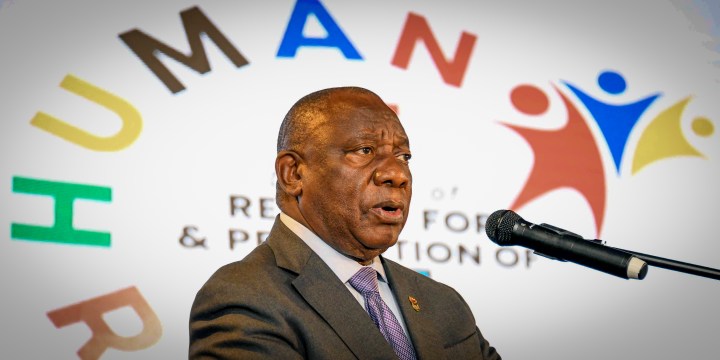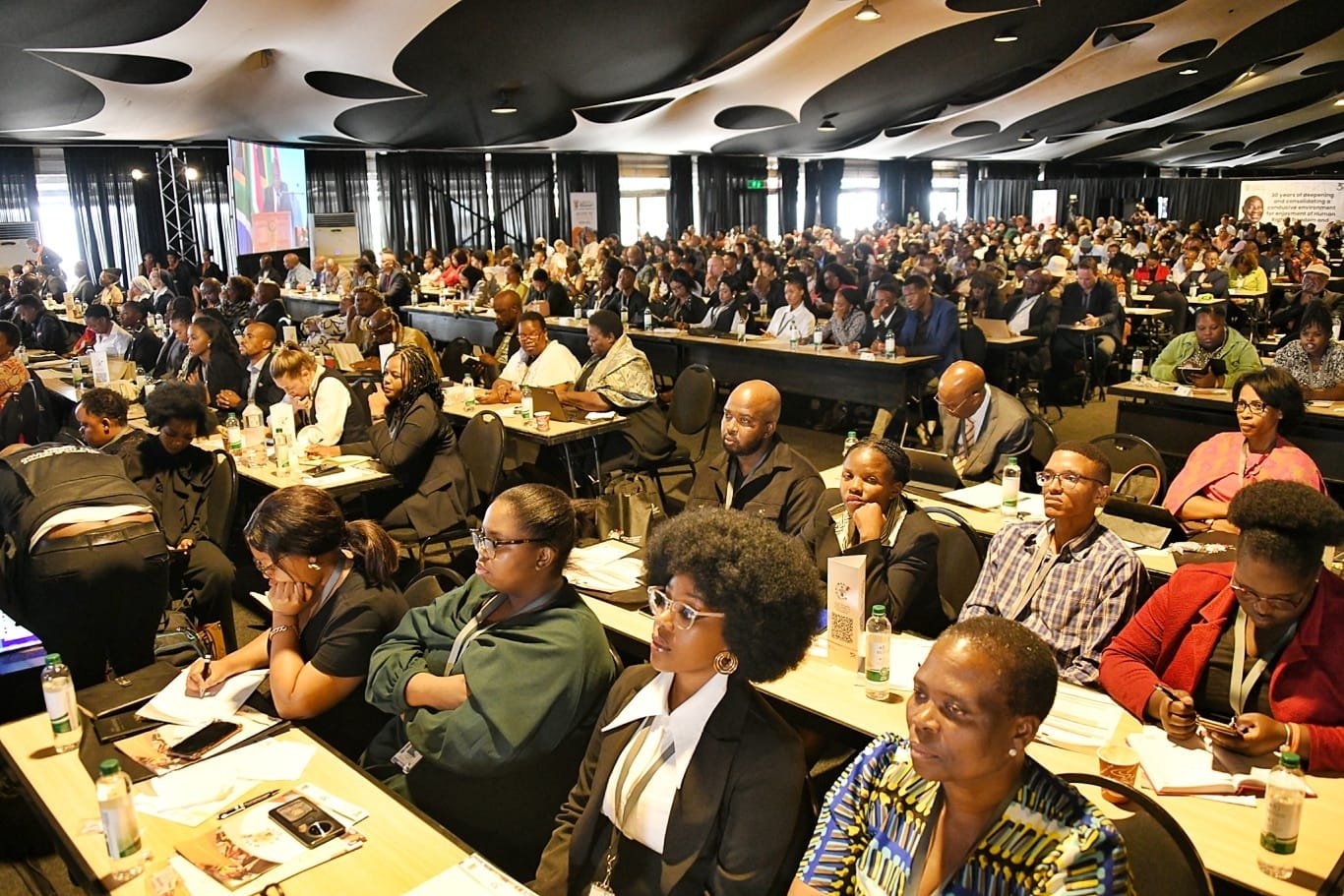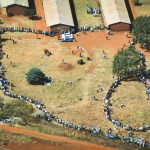FREEDOM AND EQUALITY
‘Much to be done’ – Ramaphosa acknowledges challenges to human rights in SA

As Human Rights Day draws nearer, President Cyril Ramaphosa acknowledged that though the government had made great strides in advancing human rights, more work was needed.
‘The adoption of our Constitution with its Bill of Rights by the Constitutional Assembly on the 8th of May 1996 was a great moment in our struggle to achieve a free and equal society. As I said at the time, it marked the day our country and our people came of age. I referred to our Constitution as the birth certificate of our nation.”
President Cyril Ramaphosa said this as he delivered his keynote address on Monday, 18 March 2024, at the Birchwood Hotel & OR Tambo Conference Centre during day one of the Department of Justice and Constitutional Development’s National Human Rights Conference.

Nearly 1,000 delegates from government, the judiciary and civil society descended on The Birchwood Hotel in Boksburg, Gauteng, on Monday, 18 March to attend the National Human Rights Conference hosted by the Department of Justice and Constitutional Development. (Photo: @Government)
Ramaphosa took the podium at the event hosted by Justice and Correctional Services Minister Ronald Lamola as South Africa is just days away from commemorating the 1960 Sharpeville Massacre on Human Rights Day on Thursday.
The three-day conference seeks to reflect on the state of human rights in South Africa as the nation celebrates 30 years of democracy. Ramaphosa was joined by Chief Justice Raymond Zondo and almost 1,000 delegates from government, the judiciary and civil society to take stock of the strides made to turn the Bill of Rights into reality and assess what more needs to be done to ensure all people in South Africa live in dignity.
Read more in Daily Maverick: Respecting and advancing human rights, and the barriers to the realisation of those freedoms — Part Two
“Before the advent of democracy, our country was defined by racism, segregation and discrimination. The country’s black majority were deprived of their land, their freedom and their basic human rights. Apartheid tore the social fabric of our communities apart as it violated and degraded the basic humanity of many of our people through humiliation and oppression,” Ramaphosa said.
The President said South Africa had come a long way to rectify the ills of apartheid since 1994. This included putting legislation into place to redress the inequalities created by that oppressive regime and that were still manifest — and bring South Africa’s Constitution to life.
These include the Promotion of Access to Information Act, the Promotion of Administrative Justice Act, the Promotion of Equality and Prevention of Unfair Discrimination Act, the Employment Equity Act and the Broad-Based Black Economic Empowerment Act.
“Before the advent of democracy, our country was a pariah state that was infamous for violating the basic rights of the majority of its citizens. We lived in a country where racial discrimination was at the core of government policy. Today, our country is revered as a country that upholds, protects and advances the basic human rights of the people who live in South Africa,” Ramaphosa said.
While he painted a rosy picture of how far South Africa had come, he was alive to the deep socioeconomic, political, and racial wounds that still plagued society and acknowledged that the nation still had a long road to travel.
The President admitted that progress in protecting and promoting human rights in South Africa continued to be hindered by delays and lack of diligence on the part of government entities in fulfilling their constitutional obligations.
“We continue to be plagued by poor service delivery, especially in our municipalities. Corruption deprives citizens of the fulfilment of their rights. Whilst we are rightfully proud of how far our constitutional, rights-based order has come, we know that much still has to be done to fulfil the promise of the full enjoyment of the basic human rights of all our people,” Ramaphosa said.
Ramaphosa’s claims were echoed by Professor Somadoda Fikeni, who said, “One thing is clear, one thing that is certain is that we are not where we were in 1994, but we are also not where we intended to be. That is the most important moment of reflection. We are now at the crossroads.”
Fikeni’s statement is the crux of why thousands of people descended on the Birchwood Hotel: not only to tally the success that had been clinched since South Africa’s first democratic election, but also to assess what more could be done to ensure that human rights were enjoyed by all in the country.
Corruption a threat to human rights
Aside from Ramaphosa’s keynote address, delegates were regaled by critical panel discussions that took an in-depth look into what was needed to ensure the Bill of Rights became a reality.
The common theme across the panels was that while many laws protected and promoted human rights in South Africa, there was a serious problem when it came to implementation and enforcement.
ANC veteran Dr Mathews Phosa said that bad governance and a lack of accountability threatened South Africa’s young democracy and progressive Constitution.
“I can say without fear of contradiction that South Africa’s Constitution is one of the most progressive globally. However, the challenge that continues to plague me and most people is that the Bill of Rights is beautiful – it’s a beautiful paper – but I want human rights, not paper rights. People often reflect on money as the root of all evil today. I would like to say that bad governance is the root of all evil, the scourge confronting our country,” Phosa said.
Phosa said that to realise an environment that protected human rights, there needed to be a dramatic cleansing of the cancer of corruption and an improvement of the institutions responsible for holding accountable people who deviated from the Constitution.
Read more in Daily Maverick: Corruption is South Africa’s primary and most pressing election issue
“It is bad governance that has caused the demise of the nascent democracy as year after year we see the decline of the democratic tenants with little or no consequence. Good governance and human rights are mutually reinforcing and governance failures are directly correlated to human rights prejudices,” Phosa said.
He reiterated that good governance and accountability were critical tools to protect human rights, calling for the government, the judiciary and civil society to commit to establishing good governance, which required that corrupt people were prosecuted and leaders held to account.
Women’s right to life denied
Looking at how the Constitution had fared on the promotion of human rights of women, UN Committee of Experts of Public Administration Dr Geraldine Fraser-Moleketi said reflecting on 30 years of democracy and reflecting on the Constitution allowed an opportunity to uncover several truths on what needed to be done to further promote human rights.
While Fraser-Moleketi said that there had been considerable improvements in women’s lives as a result of enabling legislative policies and government interventions, such as the right to vote, the right to own land and the right to equal compensation, far too many women still found themselves on the margins, especially on the right to life.
In 2023, crime statistics showed that women continued to bear the brunt of violent attacks in South Africa, which Frazer-Moleketi find unacceptable
“It’s quite telling that while women have made many strides and many inroads in national life since the dawn of democracy, the scourge of gender-based violence and femicide has surged upwards and unabated and thus very directly infringing on the woman’s right to freedom and security of person,” Fraser-Moleketi said.
She said women’s right to life was inalienable; however, the denial was most exemplified in unabated GBV and femicide and while there was ample legislation protecting the right to life, society was falling behind on enforcement.
“Something must change in society, but there is a broader issue that we need to return to. The public sector must ensure that those of us in positions of authority, all the public servants, do their work and not point fingers at others. At the end of the day, vulnerable women are dependent [on others to protect their rights],” Fraser-Moleketi said.
Read more in Daily Maverick: Statistic of out-of-control violence – 969 women murdered in South Africa in just three months
Beyond land reform
In opening the panel on land reform, Professor Lesiba J Teffo touched on the strides made on the issue.
“We have been talking for almost 30 years and we might have spent over a trillion years just talking, talking and talking but I am happy that we are here today to take stock on how we have gone with the talking,” Teffo said.
Panellist after panellist agreed that while major strides have been made, the nation still lagged far behind in realising true land reform. In her presentation, Minister of Agriculture, Land Reform and Rural Development Thoko Didiza said the first decade of South Africa’s democracy was about laying the foundation and putting institutions in place such as the Commission for Land Restitution, the Land Claims Court and other legal frameworks that could put meaning to what was said on land reform in Section 25 of the Bill of Rights.
Didiza said while three million South Africans had benefited from the nation’s land restitution policy and the government had redistributed about 24% of all farmland, it had missed all its targets.
The panellists said that while there had been some progress in redistributing land, there were major challenges that both the government and recipients had faced, which were hindering further progress. These included:
- Previously disadvantaged people who had received land, with minimal grants, had been unable to use the land productively;
- Infighting in trust and communal property associations through which several communities chose to manage the redistributed land collectively had made land governance and productivity nearly impossible;
- The willing buyer, willing seller model had made land reform more expensive;
- The protection of farm dwellers and workers from eviction from the land;
- The exclusion of South African citizens from the land market because of land ownership by foreigners.
Read more in Daily Maverick: No need for land reform panic — it is inevitable but must be orderly
On land ownership by foreigners not living in South Africa, Didiza said, “I think as South Africa evolves in our democracy, this is one of the areas that we will need to address. Indeed, we need to deal with the issues of land cost escalation in the prime areas of our country while at the same time creating a clear dispensation that would not scare away [foreign] investors who are necessary for our development.”
Contributing from the audience, Professor Moshe Mkhondo suggested that the problems with land reform were perhaps linked to problems with the Bill of Rights.
“How is it that the Bill of Rights hasn’t allowed us to solve the land question?” Mkhondo asked.
“Perhaps the language is ambiguous and is open to conflicting interpretation. I’m calling on the conference to look very carefully at the Bill of Rights. Two principles drive it: The first one is choice, and the second is competition. If you are in a country with serious historical imbalances, what does choice mean for those who have and those who don’t have? What does competition mean between those who have wealth and those who have no wealth? There are loopholes in the Bill of Rights that make space for those who have wealth and power.” DM




















 Become an Insider
Become an Insider
Legislation is useful but without enforcement is useless as we have seen in every aspect of society. NO ANC you have not done well. you may have created lots of paper but your only success has been to show how gutless you are in enforcing these paper dolls called legislation. your municipalities have crashed, your provinces/regions are in a mess as is parliament. we still have pit latrines, the worst example of how you have not gone very far. you police are part of the problem and all those 1000 overfed attendees are part of the problem as well as they just sit and talk. Talk is cheap – action speaks louder than words. if every one of those 1000 attendees and all of the above got off their backsides and did something about Human Rights and get their hands dirty we might get somewhere. shame on you all!
What human rights?? The corrupt ANC government has destroyed countless lives with there destruction of taxpayers money and the country! The only people who are reaping the rewards is the politicians, family and there friends!
If we take out the lies and election sloganeering, Ramaphosa’s statement “Before the advent of democracy, our country was a pariah state that was infamous for violating the basic rights of the majority of its citizens. . . . Today, our country is revered as a country that upholds, protects and advances the basic human rights of the people who live in South Africa,” should read “Before the advent of democracy, our country was a pariah state that was infamous for violating the basic rights of the majority of its citizens. . .
. . Today, our country is a pariah state that is infamous for its inability to eradicate pit latrines, its complete failure to provide clean water, its terrible policing and crime rate, and its refusal to educate its children properly, all of which makes it a country that miserably fails to uphold, protect or advance the basic human rights of the people who live in South Africa,”
Delegates were ‘regaled’ by critical panel discussions…wow!!
Famous last words “more must be done”, so Cyril do something or cop out as you constantly wasting oxygen!
Do this government know what the word human rights mean. Don’t think so. This is after they stole and wasted the money on this 1000 delegates that are the fat cats of our country. The private sector must feed the hunger by giving jobs. At the back of all the stolen and wasted money sits another fat cat and whom every morning in some or other news threatening all taxpayers if you don’t give it all and more I am on you. The head of SARS is the most back biting puppet who creep behind Cyril to get further into his ass. Meantime we don’t forget that he was with Mr Phalaphala in the shame game. Nothing happened there. Because they are both corrupt but he threaten other people. Shame on you and your whole rotten system.